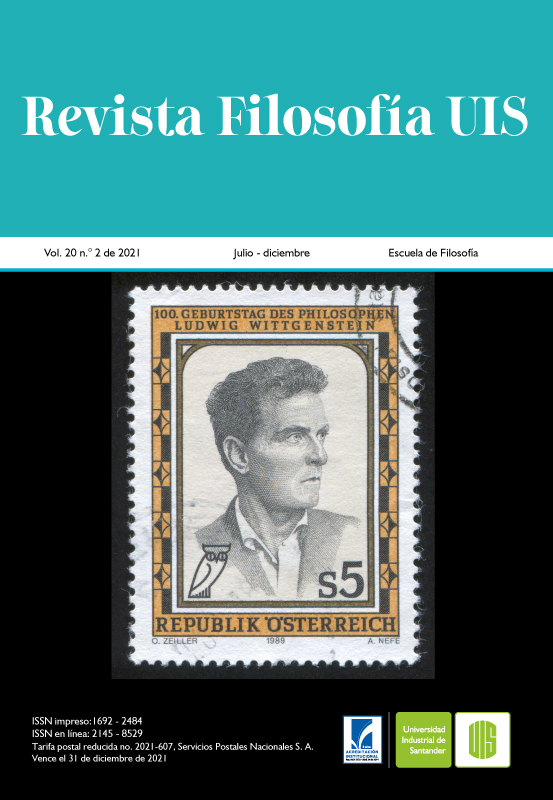Honneth: The Pathology of Reason and the Reification of the Human
Published 2021-06-11
Keywords
- reification,
- Social negativity,
- instrumentalization,
- progress of reason,
- social atomization
- pathology of reason ...More
How to Cite
Copyright (c) 2021 Revista Filosofía UIS

This work is licensed under a Creative Commons Attribution 4.0 International License.
Abstract
This article points out the conceptual tracking that Honneth makes to explain the way in which the social negativity that arises, from the historical progress of reason, accounts for the social atomization imposed by capitalism as a pathological practice that generates reification of the human being. This social reality, as a current problem, leads to the need to reactivate the postulates of critical theory to explain how the pathological of reason, described by Hegel, becomes, from the Marxist conception of history, a practical problem in that material conditions, oriented towards the logic of the division of labor, cause, according to Lukacs, that individuals assume the habit and the habit of perceiving each other as things.
Downloads
References
- Adorno, T. (1993). Consignas. (R. Bilbao, trad.). Amorrortu Editores.
- Adorno, T. (2004). Escritos sociológicos I. (A. González, trad.). Akal.
- Arato, A. y Breines, P. (1986). El joven Lukács y los orígenes del marxismo occidental. (J. Aguilar, trad.). Fondo de Cultura Económica.
- Basaure, M. (2010). El “Grupo Internacional de Estudios sobre Teoría Crítica”. Notas para una historia reciente del instituto para la investigación social de Frankfurt. Arxius, (22), 115-126. https://roderic.uv.es/bitstream/handle/10550/19406/MarioBasaure.pdf?sequence=1
- Baxter, H. (1987). System and Life-World in Habermas'stheory of communicative action. Theory and Society, 6(1), 39-86. https://doi.org/10.1007/BF00162659
- Bericat, A. (2001). Max Weber o el enigma emocional del origen del capitalismo. Reis: Revista Española de Investigaciones Sociológicas, 95(1), 9-36. http://www.reis.cis.es/REIS/PDF/REIS_095_03.pdf
- Brown, D. (1985). Institutionalism, Critical Theory, and the Administered Society. Journal of Economic Issues, 19(2), 559-566. https://doi.org/10.1080/00213624.1985.11504395
- Cohen, J. y Arato, A. (2000). Sociedad Civil y Teoría Política. (R. Reyes, trad.). Fondo de Cultura Económica.
- Cuesta, M. (2010). Preguntas y problemas en torno a la reificación… de Axel Honneth. Pensar: Epistemología y Ciencias Sociales, 5, 205-215. https://www.revistapensar.org/index.php/pensar/article/view/55
- D'Hondt, J. (1966). Hegel, filósofo de la historia viviente. (A. Leal, trad.). Amorrortu.
- De Zan, J. (2007). La figura hegeliana de la lucha por el reconocimiento. Un acontecimiento antropo-lógico-político, no moral. Agora Philosófica, 16(8), 45-67.
- Deranty, J. P. (2013). Marx, Honneth and the Tasks of a Contemporary Critical Theory. Ethical Theory and Moral Practice, 16(4), 745-758. https://link.springer.com/article/10.1007/s10677-013-9407-6
- Fleitas González, M. (2014). La reificación como un olvido del reconocimiento. Apuntes para una revisión de la idea de reificación de Axel Honneth. Andamios, 11(26), 253-275. http://dx.doi.org/10.29092/uacm.v11i26.204
- Habermas, J. (1989). El discurso filosófico de la modernidad. (M. Jiménez Redondo, trad.). Taurus.
- Habermas, J. (1992). Teoría de la acción comunicativa, II: Crítica de la razón funcionalista (M. Jiménez, trad.). Taurus.
- Hegel, G. (1968). Filosofía del Derecho. (A. Mendoza, trad.). Claridad.
- Hegel, G. (1980). Lecciones sobre la filosofía de la historia universal. (J. Gaos, trad.). Alianza Editorial.
- Honneth, A. (1992). Integridad y desprecio. Motivos básicos de una concepción de la moral desde la teoría del reconocimiento. (J. C. Velasco Arroyo, trad.). Isegoría, 5, 78-92. http://isegoria.revistas.csic.es/index.php/isegoria/article/view/339
- Honneth, A. (2007). Reificación: un estudio en la teoría del reconocimiento. (G. Calderón, trad.). Katz Editores.
- Honneth, A. (2009a). Patologías de la razón: historia y actualidad de la Teoría Crítica. (G. Mársico, trad.). Katz Editores.
- Honneth, A. (2009b). Crítica del Agravio Moral: Patologías de la sociedad contemporánea. (P. Storandt, trad.). Fondo de Cultura Económica.
- Honneth, A. (2011). La Sociedad del Desprecio. (F. Hernández y B. Herzog, trads.). Trotta.
- Horkheimer, M. (1973). Crítica de la razón instrumental. (H. Murena y D. Vogelmann, trads.). Sur.
- Jay, M. (1989). Imaginación Dialéctica. (J. Curutchet, trad.). Taurus.
- Lukács, G. (1970). Historia y Conciencia de Clase. (F. Duque, trad.). Editorial de Ciencias Sociales.
- Marcuse, H. (1993). El hombre unidimensional: Ensayo sobre la ideología de la sociedad industrial avanzada. (A. Elorza, trad.). Planeta de Agostini.
- Marx y Engels, (1974). La ideología alemana. (W. Roces, trad.). Grijalbo.
- Marx, K. (1985). Manuscritos de economía y filosofía. (F. Rubio, trad.). Alianza Editorial.
- Mitzman, A. (1976). La jaula de hierro: Una interpretación histórica de Max Weber. Alianza Editorial.
- Nietzsche, F. (1977). El nacimiento de la Tragedia. (A. Sánchez, trad.). Alianza Editorial.
- Nietzsche, F. (1978). El Anticristo. (A. Sánchez, trad.). Alianza Editorial.
- Simmel, G. (1977). Filosofía del dinero. (R. García, trad.) Instituto de Estudios Políticos.
- Simmel, G. (1986). El individuo y la libertad. Ensayos de crítica de la cultura. (S. Mas, trad.). Península.
- Smith, A. (1994). La Riqueza de las Naciones. (C. Rodríguez, trad.). Alianza Editorial.
- Suárez, J. (2010). El desplazamiento del paradigma de la producción hacia el paradigma del lenguaje en la teoría crítica de la sociedad de Jürgen Habermas. Eidos, 13, 96-129. https://dialnet.unirioja.es/descarga/articulo/3662053.pdf
- Taylor, C. (1994). La ética de la Autenticidad. (P. Carbajosa, trad.). Paidós.
- Weber, M. (1964). Economía y Sociedad. Esbozo de sociología comprensiva. (J. Medina, J. Roura, E. Ímaz, E. García y J. Ferrater, trads.). Fondo de Cultura Económica.
- Weber, M. (1979). La Ética Protestante y el Espíritu del Capitalismo. (L. Legaz, trad.). Península.
- Weiss, J. (1988). Georg Simmel, Max Weber und die Soziologie. En O. Rammstedt (Ed.), Simmel und die frühen Soziologen: Nähe und Distanz zu Durkheim, Tonnies und Max Weber (pp. 36-63). Suhrkamp.

